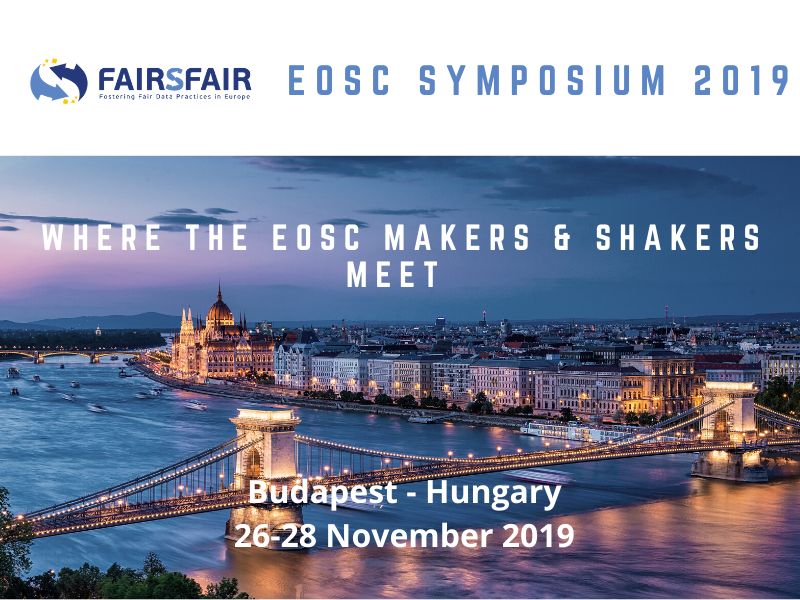FAIRsFAIR at the EOSC Symposium 2019

The annual EOSC Symposium is the premier event in the EOSC calendar and unites stakeholders around intense discussion over three full and stimulating days. Contributions are invited for the 2019 event which takes place in Budapest and is co-organised by the EOSCsecretariat project and the principal eInfrastructures initiatives EOSC-hub, GEANT, OpenAIRE and PRACE in collaboration with the EOSC Governance Board, and the EOSC Executive Board and its Working Groups,
As is customary, the programme format incorporates topic-focused breakout sessions, plenary sessions oriented around social themes, and a poster gallery. Participants may also submit questions ahead of time using the event hashtag #EOSCsymposium2019 on Twitter or via an online form. The contribution deadline is 25 October.
Click here to register and here to book your accommodation. Hotel bookings made before 25 October will atttract he EOSC Symposium special rate.
The following FAIRsFAIR submissions have been accepted for inclusion amongst the breakout sessions:
Action towards FAIR in practice
26th November 21019, 11.30 - 13:00, Breakout 1 | Room: Helia conference hall
chaired by: Sarah Jones & Liisi Lembinen, EOSC FAIR WG & Ilona von Stein, Angus White, FAIRsFAIR
The objectives of this session are to share perspectives and practical suggestions to improve FAIR practices, to identify how communities are being supported on FAIR data stewardship and to identify synergies in the support measures for FAIR practice planned or already developed by EOSC projects.
FAIR Metrics - FAIR Data Assessment in European Digital Repositories: Requirements and Use Cases
26th November 2019, 14:30-16:00, Breakout 2 Session: FAIR Metrics, | Room Orion
chaired by: Anu Devaraju, MARUM; Edit Herczog, RDA FAIR Data Maturity Model WG; Mustapha Mokrane, DANS; Konstantinos Repanas, European Commission | Architecture WG, FAIR WG, Rules of Participation (RoP) WG
Data is a valuable asset for enabling scientific research and applications. The FAIR principles aim at providing guidelines to ensure that research objects (e.g., data, software) are discoverable and available to potential users for reuse. The overall goal of the FAIRsFAIR project is to accelerate the realization of the goals of the EOSC by opening up and sharing all knowledge, expertise, guidelines, implementations, new trajectories, courses and education on FAIR matters. The Work Package 4 of the project aims at developing and providing practical solutions for testing and implementing the FAIR principles for research data in selected European Trusted Digital Repositories (TDRs).
This session will provide an overview of the evaluation requirements for FAIRness in individual datasets, including FAIR data assessment metrics. A methodology for running pilots to support the assessment of FAIR data in trustworthy repositories will also be presented alongside two use cases. The first use case focuses on a data creator who may self-assess the FAIRness of his/her dataset based on the metrics. The second use case focuses on a data repository which may apply the metrics to assess the FAIRness of datasets as part of their curation workflows. This work plays an important role in translating FAIR principles into practice, specifically through the practical solutions available to different user groups.
EOSC Skills and Training - Towards a Roadmap for an EOSC training resources catalogue and cross-project training activities
27th November 2019, Breakouts 3 and 4 | Room: Panorama
chaired by: Natalia Manola, EOSC-EB Member
The Community of Practice for Training Coordinators (CoP) is an informal network of training coordinators with representatives from research, and e-infrastructures, and universities. They aim to promote the sharing of best practices and cross-infrastructure training activities in EOSC, improve the availability, discoverability and interoperability of learning materials and training resources with open standards in mind, and pool these resources across EOSC as effectively as possible.
In the break out session, the group proposes working together on recommendations and proposed actions to establish an EOSC training resources catalogue within the EOSC Portal in order to make it visible and accessible. Based on a consideration of existing resources including TeSS training resources and events - portal (ELIXIR), FOSTER OS portal, the OpenScienceMOOC, and others, topics for discussion will include:
- need for globally used metadata for learning resources, courses and/or curricula (schema.org/LRMI, terms4FAIRskills, FAIRterms, or other)
- approaches to aggregating metadata, federating competence centres and training infrastructure, and curating generic training resources and training tools
- quality criteria for learning resources (badges, reviews, recommendations, comments, board of editors)
- effort requirement and sustainability of a training & skills catalogue in EOSC
Panellists will include representatives from FAIRsFAIR, EOSC Enhance, EOSC Synergy and EOSC Secretariat. It is envisaged that the session will result in the creation of a cross-project implementation team to address planning and coordination. It is also envisaged that the roadmap developed will be presented as a pilot at the EOSC project coordination meeting.
FAIR Services Certification - Services to support FAIR data: Recommendations and actions
Impact of Requirements of FAIR on Technical Architecture - Towards Sustainable Semantic interoperability
27th November 2019, 11:30 - 13:00, Breakout 3 | Room Orion
chaired by: Jean-François Abramatic, EOSC Architecture WG | Related EOSC WGs: Architecture WG, FAIR WG
Dedicated to presenting the first of three reports on FAIR requirements for persistence and interoperability, this session will focus on the identification of domain-specific standards and practices and gaining an understanding of the situation in a wide range of research domains. Reference will be made to desk research, a survey and expert interviews, as well as to relevant work on creating semantic interoperability performed outside of the EOSC and ESFRI frameworks. The aim is to create the basis for continued work on sustainable technical implementation of the FAIR principles on a broad level and to improve understanding of the current variety in FAIR data standards.
